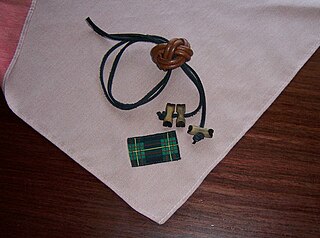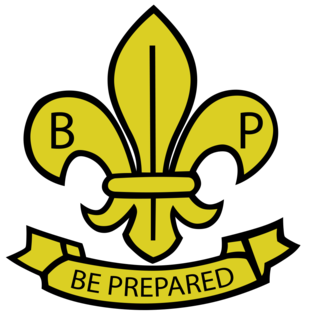
A Scout is a child, usually 10–18 years of age, participating in the worldwide Scouting movement. Because of the large age and development span, many Scouting associations have split this age group into a junior and a senior section. Scouts are organized into troops averaging 20–30 Scouts under the guidance of one or more Scout Leaders. Troops subdivide into patrols of about six Scouts and engage in outdoor and special interest activities. Troops may affiliate with local, national, and international organizations. Some national Scouting associations have special interest programs such as Air Scouts, Sea Scouts, outdoor high adventure, Scouting bands, and rider Scouts.

Persekutuan Pengakap Malaysia is the largest youth organisation in Malaysia and member of World Organization of the Scout Movement (WOSM).

Explorer Scouts, a section of the Scout Association in the United Kingdom for 14- to 18-year-olds, was introduced in 2001 replacing Venture Scouts. This was part of a greater change in programme, including the introduction of Scout Network for 18- to 25-year-olds. The aim of the section is to provide a flexible and active Scouting programme for adolescents and young adults, with an emphasis on personal challenge and adventure.
Scouts South Africa is the World Organization of the Scout Movement (WOSM) recognised Scout association in South Africa. Scouting began in the United Kingdom in 1907 through the efforts of Robert Baden-Powell and rapidly spread to South Africa, with the first Scout troops appearing in 1908. South Africa has contributed many traditions and symbols to World Scouting.
Venturer or Venture Scouts are programs in some Scouting organisations for young people of various age ranges in the 14–20 age range. A participant in the program is called a Venturer.
Rover Scouts, Rovers, Rover Scouting or Rovering is a service program associated with Scouting for young men and, in many countries, women, into their early 20s. A group of Rovers is called a 'Rover Crew'.

The 2005 National Scout Jamboree was the 16th national Scout jamboree of the Boy Scouts of America and was held from July 25, 2005 through August 3, 2005 at Fort A.P. Hill, Virginia. Normally, the next jamboree would be held four years afterward in 2009, but the date was changed so that the next jamboree could take place in 2010, the centennial anniversary of Scouting in the United States.

A Scout leader or Scouter generally refers to the trained adult leader of a Scout unit. The terms used vary from country to country, over time, and with the type of unit.

Scouts BSA is the flagship membership level of the Boy Scouts of America (BSA) for boys and girls between the ages of 11 and 17. It provides youth training in character, citizenship, and mental and personal fitness. Scouts are expected to develop personal religious values, learn the principles of American heritage and government, and acquire skills to become successful adults.
The Scout section is the direct descendant of the original Scout Patrols which formed The Scout Association of the United Kingdom in 1908. The section is open to both boys and girls between the ages of 10½-14 years, and are now formed into local Scout Troops which in turn form part of a Scout Group. The Scout section follows on from the Cub Pack and Scouts will move onto the Explorer Scout section at the age of 14.

The Boy Scouts of America (BSA) was inspired by and modeled on the Boy Scout Association, established by Baden-Powell in Britain in 1908. In the early 1900s, several youth organizations were active, and many became part of the BSA.
Scouts is the section of Scouts Australia for boys and girls aged 10.5 - 15, although they can move up to the Venturer Scouts section from the age of 14.5. It follows the Cub Scout section. Scouts belong to patrols, headed by a youth leader as Patrol Leader, with an Assistant Patrol Leader. Patrols are grouped into a Scout Troop. The adult leaders or Scouters are a Scout Leader (SL) and one or more Assistant Scout Leaders (ASL). The troop is managed by the Troop Council, which consists of the Patrol Leaders advised by the Scout Leader. Scouts was the first section of the Scout Movement to be founded.

Scouts in Scouting Ireland are aged between 11 and a half to 16 years of age. Each group has a Court of Honour/Patrol Leader's Council which under the guidance of an adult Scouter designs and implements activities. Scouts is the section where activities begin to really challenge the youth member and impart responsibility and self-reliance in accordance with the Scout method and the educational philosophy of Baden-Powell. The association also currently has Sea Scout and Air Scout programmes. The highest award is the Chief Scout Award

Cub Scouts or Cubs are an age-based section of The Scout Association for young boys and girls ages 8 to 10½. This section follows on from the Beaver Scouts and Cubs will move on to Scouts at the age of 10½. The section originally opened as Wolf Cubs in 1916.

A Scout troop is a term adopted into use with Boy Scouts, Girl Scouts and the Scout Movement to describe their basic units. The term troop echoes a group of mounted scouts in the military or an expedition and follows the terms cavalry, mounted infantry and mounted police use for organizational units.

Wood Badge in the United States is the highest level of adult Scout leader training available. It was first presented in England by the founder of Scouting, Baden Powell, and he introduced the program into the United States during a visit in 1936. The first course was held at the Mortimer L. Schiff Scout Reservation, but Americans did not fully adopt Wood Badge until 1948. The National BSA Council staff provided direct leadership to the program through 1958, when the increased demand encouraged them to permit local councils to deliver the training.

The Baden-Powell Scout Award (BPSA), or B-P Award is the highest youth award achievable in the Scout and Guide Movement in several countries. Although, with the withdrawal of the Rover Section from most Scout Associations it has become a less common award, it is still awarded by Guide and Scout Associations in several countries, including Australia, Brazil, Guatemala, Hong Kong, Singapore, South Africa, New Zealand and in non-World Organisation of the Scout Movement (WOSM) associations in the United Kingdom.

The Baden-Powell Service Association (BPSA) is a traditional and inclusive co-ed scouting organization in the United States that takes its name from the Scouting movement founder, Robert Baden-Powell. The BPSA is a member of the World Federation of Independent Scouts (WFIS).
The personal progression system for youth members of Scouting Ireland has been designed and refactored since the merger of earlier organisations.














